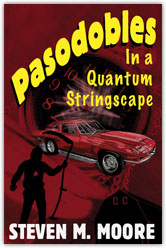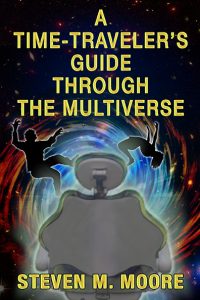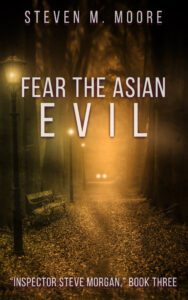Dr. Carlos and the Wicked Will
Copyright 2022, Steven M. Moore
“Would it be impolite to ask you what your Human wills entail?” said N’Roku, one of the Tali, as they sat around the campfire not far from their crippled hovercraft.
“They’re rather traditional legal documents even if they’re just e-files now and stipulate how the property of a Human—or even a non-Human’s within the ITUIP, allowing for some local variations—are left to one or more people, or even charities and institutions. Conditions are often placed on those who would receive this property, though. For example, they must be alive. In this case,” he glanced at the Tali, which required a look upward, “the condition is that I’m dead.”
The spit was still turning slowly with half the carcass of a large hopping creature still on it. Not one tourist in the group who was a flesh eater had liked the wild taste. Of course, the Rangers had done fine with the fish-like creatures they’d caught in the lake. In a sense, Carlos envied them, but he hadn’t been too hungry since the AI had read the will.
Fortunately, one Human, a woman named Karla Ponce, had found both syntho tea and coffee in a hovercraft closet. Although it might have been there from an earlier time when Human employees of the tour company manned it and offered refreshments to passengers, all the Humans appreciated the hot beverages. Ah, progress, Carlos thought. ‘Tis a wonderful thing, except when it isn’t. And now that damn AI is almost completely offline!
The Tali’s ears were twitching in a way that Carlos knew signified amusement. “Should we all gang up on you now and tear you apart limb by limb?”
“Don’t be crass,” Thom Sideman, one of the Humans, said to N’Roku. “We have to ignore that old woman’s wishes. Clearly she was mentally disturbed and had it in for Dr. Obregon. Do you have any idea why that was, Carlos?”
They were all on first name basis now, so Carlos felt the group’s dynamics had ceased to reflect the wariness of strangers. He still didn’t know that much about their backgrounds, though, the Humans or ETs’, so he wasn’t about to mention what he suspected to be true. And maybe the common home planet and surname are still just coincidences?
Detectives throughout history often said they didn’t believe in coincidences, though. If there was anything to the ones involving the will’s creator, how had the old woman known he’d be on the same tour when he’d decided to go on it only at the last moment? And how had she added the reading of the will to the AI’s programming? For that matter, why was the AI now completely offline? The landing had been a soft one. Had she somehow programmed all that? Or, did she have an accomplice?
“Does anyone here know about programming an AI?” he called out to everyone huddled around the dying fire. “If we can reboot the hovercraft’s, we can guide our rescuers to this place. It might take them days otherwise.”
“I do,” Orl the Usk said. “But there are no tools.”
“There was a toolkit in the closet where I found the tea and coffee,” Karla Ponce said. “Let me show you.”
Carlos held up a hand. “We should probably all go inside now to sleep with the hatch closed. You’ve all seen those local predators from the air. N’Roku, could you help me put out the fire?”
“What about the leftover meat?”
“Give it a good fling. Maybe it will keep the predators busy enough to forget about us.”
***
After everyone was comfortably settled in their seats, Carlos and Orl went to work. The toolkit seemed to be designed for making repairs to electronics, even living biocircuitry, the AI’s wiring a combination of both, so the Usk was happy about that. He was very good with his hands and, of course, Carlos’s surgical expertise using the kit’s many tiny tools allowed him to help a lot. Knowing that the translation software still worked allowed them to quickly find the problem and begin repairs. They soon could converse with the AI again, but it informed them there was no comlink to base, which had been their main goal. Nearing the end of the repair process, Orl had run a diagnostic subroutine, and the AI had informed them that whatever software changes Alger had made had also created a time-delayed power surge that had fried the comlink. They couldn’t repair that.
“You had a good idea, Carlos,” said the Usk, “but she was a right nasty old female Human, wasn’t she?”
He sighed but was glad that most of the others were already sleeping. No wonder. I’m exhausted too. “Can we at least rig some sort of beacon? If bright enough, it might be seen from Euphoria’s space station where my ship is docked.”
“Bad line-of-sight angle,” said Swims-in-Shadows, one of the Rangers, who’d come to peer around Carlos at their repair job. “How about a controlled burn? There’s a cluster of those huge trees not far from our hovercraft. I saw it when we were landing.”
“How long would that last?” Orl said.
“No idea,” said the Ranger, “but it would be brighter than anything we can create artificially.”
“I hate to destroy the local environment,” Carlos said. “And fires all too often get out of control. It might even reach the hovercraft.”
“I can move the hovercraft farther away if that occurs,” said the AI, startling everyone involved in the conversation. “Com’s out, precluding any major flights, but a quick hop locally is possible.”
“That settles it,” Orl said. “Where are those flares we used to start our cooking fire? We’ll begin at the near edge of that cluster so the burn moves away from the hovercraft. When we return, we’ll watch carefully to see if the AI’s hop is needed. I doubt it.”
“The other side of the cluster abuts the far end of the lake,” said the Ranger. “I saw that when I went fishing.”
Carlos shrugged. “Okay. At least it will keep us busy.”
***
Carlos woke N’Roku early. The three, N’Roku, Orl, and Carlos, left the Ranger to guard the other tourists who were still sleeping and headed for the copse of trees.
As they walked, Orl said to Carlos, “Not afraid we’ll gang up on you?”
“I trust you and N’Roku and Swims-in-Shadows as well. And there’s no other option. The other tourists seem to be simple souls with no survival instincts, except for Ponce for the coffee and tea. Of course, if you and the Tali want to kill me, there’s not much I can do about it. Humans are fragile creatures compared to Tali and Usks.”
They got a nice fire going, although the burn went slowly, so Carlos suggested that they scout out the lay of the land as it sloped down toward the edge of the lake, which would stop the fire from advancing any farther. N’Roku returned to the hovercraft to inform the others of their progress and warn the AI to move if that was required.
“Swims-in-Shadows was right,” Carlos said to Orl. “The trees go right down to the lake’s edge.” Carlos stared across the shimmering waters. “This is a beautiful and peaceful place.”
“A fitting place for you to die, Dr. Obregon,” said a voice behind them.
They turned and saw the female Human Karla Ponce. She held a needle gun, and it was pointed at Carlos.
“Where’d you get that gun?” Carlos said.
“Same closet as the toolkit and flares, you idiot. I’m sorry. You seem like a nice man, but I can really use those funds.”
He laughed. “Obviously enough to commit murder. Congratulations. I would never have suspected that you’d be the one.”
“Ideally, all the Humans are going to split the inheritance. I just drew the short straw.”
Carlos wondered what they’d used for straws.
“I’m not a participant in this conspiracy, Carlos,” Orl said.
“Of course not,” Karla said. “I said just we humans, you fool. Why should we split with any slimy ETs?”
Carlos was always amazed how often Humans’ xenophobia reared its ugly head. Other ET groups had that mental disease as well, of course, especially when they had their first contacts with other intelligent beings—the Tali and Usks were examples—but for the most part the disease succumbed to the realization that peaceful coexistence and cooperation were beneficial to all. The Union was built on that principle.
“I see that Alger chose wisely,” Carlos said. “Just to humor me, to grant my dying wish, if you want to call it that, how do you plan to use those funds? You’re not likely to escape from Euphoria’s authorities.”
She shrugged. “To be determined. But we’ll all get our story straight, don’t you worry. The AI can be put out of commission again, so it won’t be reporting on anything. And a needle gun will work perfectly well on the non-Humans.”
“Are you sure about that? I’m a medical doctor, and I’ve studied and attended a lot of ETs in my time.” Carlos jerked a thumb toward his Usk companion. “The poison in your needle gun won’t even affect him. Not Rangers or Tali either. They all use blasters for that reason.”
She hesitated. “Will it slow him down?”
Carlos nodded at Orl. “She’s so stupid that she expects me to answer that.” He turned back to Karla. “Forget the needle gun. You have something else to worry about. Can you swim? The fire soon will be upon us. If you kill me and manage to slow down Orl, you will still have a long swim back along the lake. Without knowing what lethal fauna might be found there.” He now winked at Orl.
As Carlos expected, she turned to look back toward her rear to see how near the burn was. The Usk moved with lightning speed and was soon standing over Karla and covering her with the needle gun.
“What the good doctor neglected to tell you, although I’m sure he knows, is that we Usks can move very fast and have fast reflexes. Our bodies’ form of adrenalin is much more potent than Humans’, which is also why a needle gun doesn’t usually kill us.”
“Where’s the fire?” Fear was etched on Karla’s face now.
Carlos laughed. “Unlike Orl, my friend here, it can’t move very fast. The ground is too moist and the trees too wet. You were so intent on following us that you missed those details. You and the other Humans will soon be living in the nice penal colony they have here on a nearby island. I don’t think ITUIP will be negotiating for your release either.”
***
“You know, Dr. Obregon, we treat tourists well here,” said the local police commissioner, a nice woman Carlos was having some kind of local tea with. “We hate to punish them for crimes they commit, often looking the other way. But this case will be an exception, let me assure you. Maybe their actions surprised you?”
He looked at her over his teacup and took another bite of his cookie, also a local concoction that was delicious. He seemed to remember that afternoon tea had once been a tradition in some ancient Earth country. It was a nice one, especially when the person serving was an attractive Human female.
“Oh, I’m not surprised, especially in this case.” He told her the story about Alger’s brother. “So, you see, it was simple revenge. Quite cleverly done, I might say. But let’s change the topic.” He eyed her. “I have a few days of leave left me, Commander. I took that tour because I was bored. But I’m sure you know a lot more about local sights to see and places to visit. Can I invite you to dinner so we can talk about them.”
She laughed. “I can do more than that. I have the next two days off. We won’t do justice to our lovely planet, but I can give you a grand and personal tour. My only condition?” He nodded. “That you tell me more about your adventures in the SEB.”
He offered a hand. “That’s a deal, Commander.”
“You can call me Twill for the next few days.”
“That’s a lovely name for a lovely lady.”
***
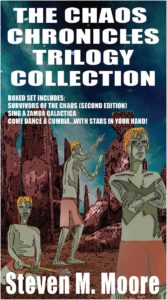 Comments are always welcome. (Please follow the rules listed on my “Join the Conversation” web page. If you don’t, your comment will be considered spam.)
Comments are always welcome. (Please follow the rules listed on my “Join the Conversation” web page. If you don’t, your comment will be considered spam.)
The Chaos Chronicles Trilogy Collection. In this ebook bundle of the three novels, Survivors of the Chaos, Sing a Zamba Galactica, and Come Dance a Cumbia…with Stars in Your Hand, the reader can find much of ITUIP’s history that Carlos Obregon is referring to in the above story. These three hard sci-fi novels, all “evergreen books” because they’re as fresh as the day I finished their manuscripts, can be considered my Foundation trilogy. Unlike the famous Isaac Asimov, though, there are plenty of ETs, something that’s obvious even in this short story. The most unusual ones are the Rangers, the first ETs Humans encountered on Carlos Obregon’s home planet New Haven. For more Carlos Obregon tales, see “Dr. Carlos, Chief Medical Officer,” a free PDF download from the list on my “Free Stuff & Contests” web page.
Around the world and to the stars! In libris libertas!
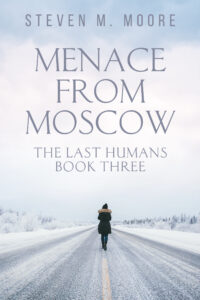 Comments are always welcome. (Please follow the rules on the “Join the Conversation” web page. If you don’t, your comment will be considered spam.)
Comments are always welcome. (Please follow the rules on the “Join the Conversation” web page. If you don’t, your comment will be considered spam.)
